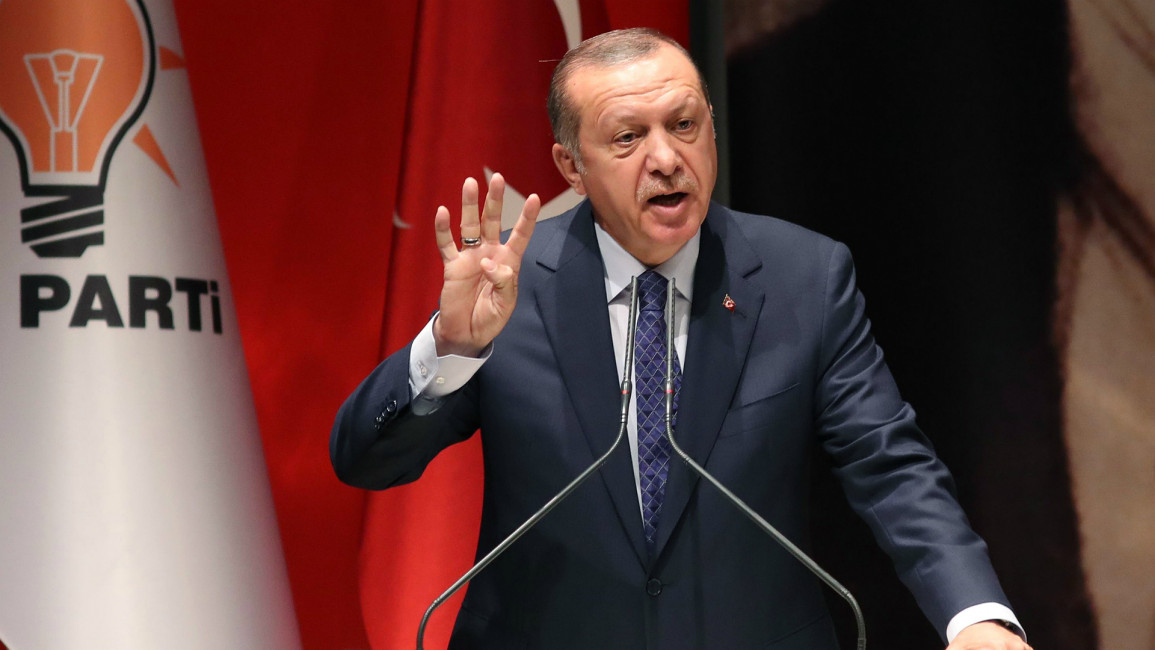Prolonging Qatar blockade 'not in anyone's interest', Turkey says
"No-one has any interest in prolonging this crisis any more," Erdogan said before leaving Istanbul airport.
He accused "enemies" of seeking to "fire up tensions between brothers".
Erdogan, whose country has come to Qatar's aid in the crisis, first had talks in Jeddah with King Salman who hailed the Turkish leader's "efforts in the fight against terrorism and its financing," Saudi state news agency SPA reported.
Erdogan is scheduled to fly to Kuwait next before heading to Qatar on Monday for his first face-to-face talks with Emir Sheikh Tamim bin Hamad al-Thani since the crisis began.
Erdogan praised Qatar's behaviour in the crisis, saying Doha had sought to find a solution through dialogue. "I hope our visit will be beneficial for the region," he said.
On 5 June, Saudi Arabia and allied states - Bahrain, United Arab Emirates and Egypt - cut all ties with Qatar, closing its only land border, banning planes from their airspace and barring Qatari nationals from passing through their airports.
They accused Qatar of supporting and funding "terrorism" and working with regional rival Iran - charges Doha vehemently denies.
Ankara has strongly backed Qatar throughout the standoff.
But the crisis with Qatar has put Turkey in a delicate position and Erdogan has repeatedly said he wants to see the end of the dispute as soon as possible.
Over the last years, Qatar has emerged as Turkey's number one ally in the Middle East, with Ankara and Doha closely coordinating their positions on a number of issues including the Syria conflict, where both are staunch foes of President Bashar al-Assad.
Turkey is also in the throes of setting up a military base in Qatar - its only such outpost in the region. It has sped up the process since the crisis began and now reportedly has 150 troops stationed at the base.
Erdogan is likely to get a warm welcome in Doha where Turkey has been loudly applauded for sending in food, including fruit, dairy and poultry products by ship and by plane to help Doha beat an embargo.
Turkey has also benefited, with its exports to Qatar doubling in the past month to more than $50 million. According to the economy ministry, Ankara has sent around 200 cargo planes filled with aid since the crisis began.
"From the first moments of the Qatar crisis, we have been on the side of peace, stability, solidarity and dialogue," said Erdogan.
But Turkey, which is also going through a turbulent time with the European Union and the United States, also does not want to wreck its own relations with regional kingpin Saudi Arabia.
"As the elder statesman in the Gulf region, Saudi Arabia has a big role to play in solving the crisis," said Erdogan, without explicitly criticising the kingdom.
Erdogan said he supported the mediation efforts of Kuwait's Emir Sheikh Sabah al-Ahmad al-Sabah, a possible indication Ankara sees Kuwait as the key to solving the crisis.
On Friday, Qatar's Emir Sheikh Tamim bin Hamad Al-Thani said he was ready for talks to resolve the crisis so long as the emirate's sovereignty is respected.
Erdogan is also expected to discuss regional issues including rising tensions in Palestine at al-Aqsa mosque.



